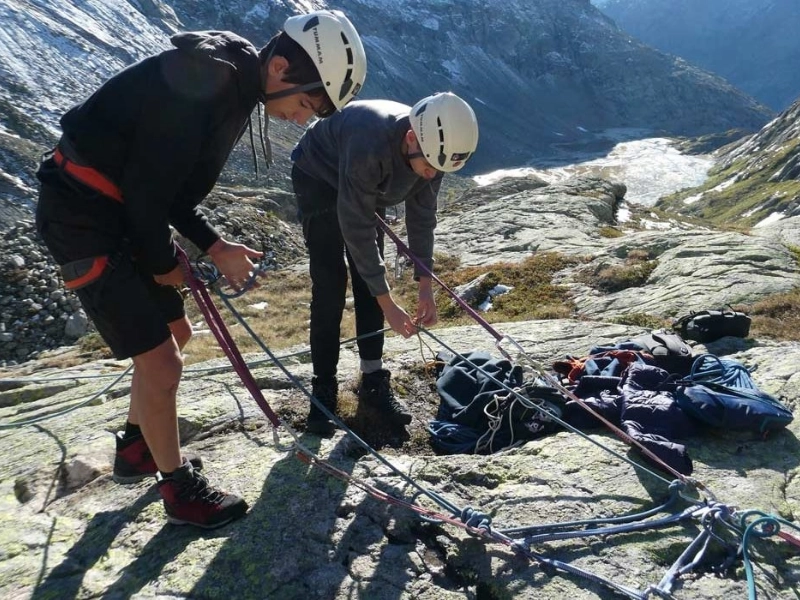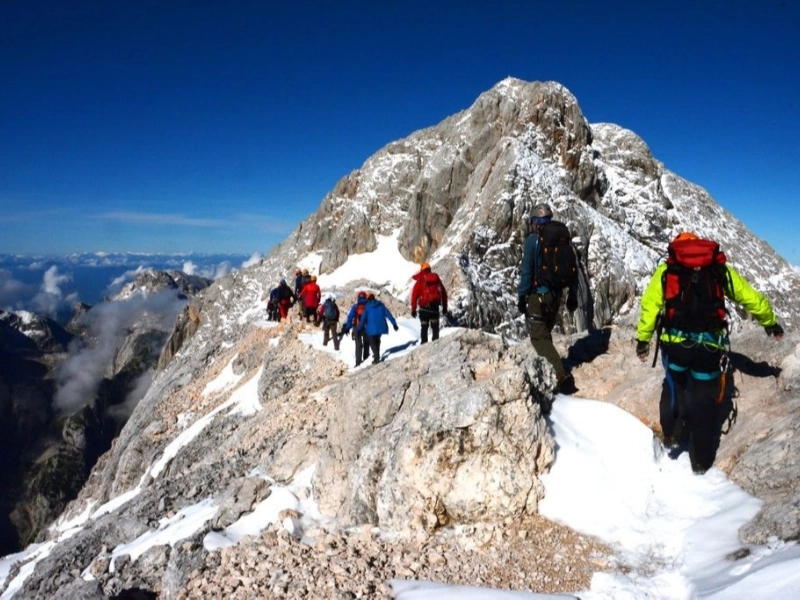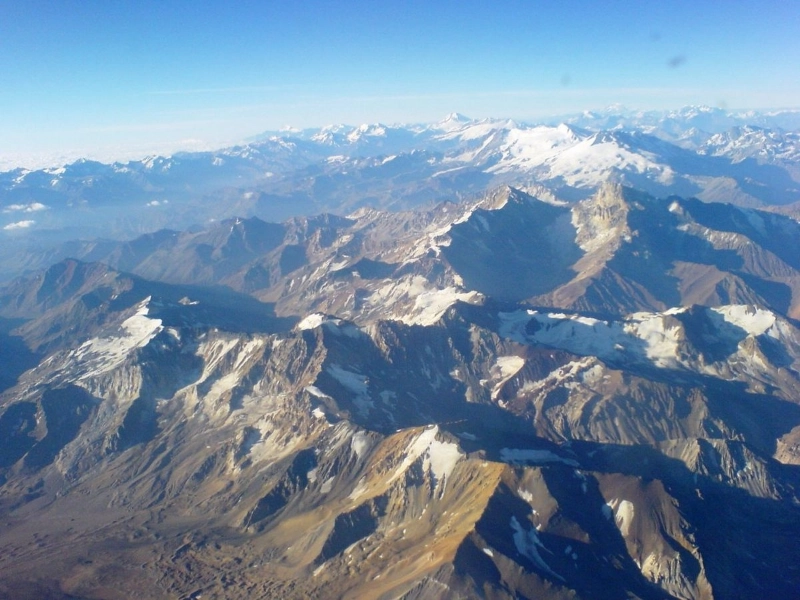Numerous climbing techniques are included in the category of mountaineering. It is crucial to select a mountain that corresponds with your degree of experience, ranging from straightforward snow routes to multipitch complex ice climbs and glacier travel. It's also critical to be familiar with and knowledgeable about your equipment. Safety requires the ability to utilize a rope and tie precise knots.
 Engaging in mountaineering introduces one to an entirely new realm of outdoor abilities and difficulties. It's crucial to begin with smaller, less strenuous climbs and then progressively raise the difficulty. Selecting a mountain to climb necessitates study and familiarity with the topography, climate, and conditions. In addition to chatting with other mountaineers and reading blogs, online services such as Summit Post and Mountain Project are great resources to aid with this.
Whether using a paper map or a GPS, mountaineers must be adept at backcountry navigation. Any conditions, including snow, rockfall, or avalanches, that might have an impact on their route should be known to them.
If they intend to perform any alpine climbing, they should also be knowledgeable about rappel systems and glacier transit methods. Lastly, it's critical that climbers have a means of communication with search and rescue personnel in the vicinity of the peak they intend to summit. This includes having a map, knowing their plan and route, and having all of their emergency contact information on hand.
Engaging in mountaineering introduces one to an entirely new realm of outdoor abilities and difficulties. It's crucial to begin with smaller, less strenuous climbs and then progressively raise the difficulty. Selecting a mountain to climb necessitates study and familiarity with the topography, climate, and conditions. In addition to chatting with other mountaineers and reading blogs, online services such as Summit Post and Mountain Project are great resources to aid with this.
Whether using a paper map or a GPS, mountaineers must be adept at backcountry navigation. Any conditions, including snow, rockfall, or avalanches, that might have an impact on their route should be known to them.
If they intend to perform any alpine climbing, they should also be knowledgeable about rappel systems and glacier transit methods. Lastly, it's critical that climbers have a means of communication with search and rescue personnel in the vicinity of the peak they intend to summit. This includes having a map, knowing their plan and route, and having all of their emergency contact information on hand.
 You will have to interact with other climbers, regardless of the kind of mountain climbing you choose. This is particularly crucial in challenging sections of the trip when you have to decide what to do and talk about safety issues. Enrolling in classes offered by outdoor businesses and clubs or becoming a member of a mountaineering club are the best ways to acquire these skills.
In terms of mountaineering skills, backcountry navigation comes in second. This entails being able to utilize a GPS or smartphone app, read a map, and use an altimeter. It also covers wilderness survival skills like building a shelter and calling for assistance in case you become lost.
A common error made by novice climbers is becoming overly fixated on reaching the summit. Recall that the majority of accidents in mountaineering occur on the descent. It will save you time and effort if you are ready to turn around if the situation becomes too risky.
You will have to interact with other climbers, regardless of the kind of mountain climbing you choose. This is particularly crucial in challenging sections of the trip when you have to decide what to do and talk about safety issues. Enrolling in classes offered by outdoor businesses and clubs or becoming a member of a mountaineering club are the best ways to acquire these skills.
In terms of mountaineering skills, backcountry navigation comes in second. This entails being able to utilize a GPS or smartphone app, read a map, and use an altimeter. It also covers wilderness survival skills like building a shelter and calling for assistance in case you become lost.
A common error made by novice climbers is becoming overly fixated on reaching the summit. Recall that the majority of accidents in mountaineering occur on the descent. It will save you time and effort if you are ready to turn around if the situation becomes too risky.
 Being able to save oneself is one of the most crucial mountaineering abilities. Every mountaineer needs to be aware of the various scenarios that can cause a climber to suffer life-threatening injuries or even pass away in the mountains. These problems include safe rappelling, correct belaying, and knotting. In addition, the climber needs to be proficient in harness usage and communication with the belayer.
A map, compass, and GPS are examples of navigational aids that climbers should be familiar with. They should also be aware of the possibility of avalanches and be able to read a weather map. Mountaineers should also know how to administer first aid. In order to help them figure out their elevation on the mountain, they also need to be able to utilize an altimeter. This information is crucial since it will make it easier and faster for rescuers to locate a lost climber. For individuals who are traveling across glaciated terrain, this ability is very important.
Being able to save oneself is one of the most crucial mountaineering abilities. Every mountaineer needs to be aware of the various scenarios that can cause a climber to suffer life-threatening injuries or even pass away in the mountains. These problems include safe rappelling, correct belaying, and knotting. In addition, the climber needs to be proficient in harness usage and communication with the belayer.
A map, compass, and GPS are examples of navigational aids that climbers should be familiar with. They should also be aware of the possibility of avalanches and be able to read a weather map. Mountaineers should also know how to administer first aid. In order to help them figure out their elevation on the mountain, they also need to be able to utilize an altimeter. This information is crucial since it will make it easier and faster for rescuers to locate a lost climber. For individuals who are traveling across glaciated terrain, this ability is very important.
 Having the right equipment is one of the most vital skills for mountaineering. This entails carrying an assortment of climbing equipment, such as ice tools, helmets, and ropes. Understanding how to use these technologies is also essential. A climber should be able to operate an ascender, which is a mechanical device used to ascend a rope, and tie friction knots, for instance.
Navigation is yet another crucial ability. A mountaineer needs to be able to use equipment such as a map, GPS unit, altimeter watch, compass, and personal locator beacon ("PLB") to navigate backcountry terrain. A wilderness first aid course is a must before starting any mountaineering adventures. This is due to the fact that in the Highlands, trained responses may be hours or even days away. Enrolling in a wilderness first responder course is a smart way to get trained in these techniques. When hiking in backcountry locations, you should also always carry the Ten Essentials.
Having the right equipment is one of the most vital skills for mountaineering. This entails carrying an assortment of climbing equipment, such as ice tools, helmets, and ropes. Understanding how to use these technologies is also essential. A climber should be able to operate an ascender, which is a mechanical device used to ascend a rope, and tie friction knots, for instance.
Navigation is yet another crucial ability. A mountaineer needs to be able to use equipment such as a map, GPS unit, altimeter watch, compass, and personal locator beacon ("PLB") to navigate backcountry terrain. A wilderness first aid course is a must before starting any mountaineering adventures. This is due to the fact that in the Highlands, trained responses may be hours or even days away. Enrolling in a wilderness first responder course is a smart way to get trained in these techniques. When hiking in backcountry locations, you should also always carry the Ten Essentials.